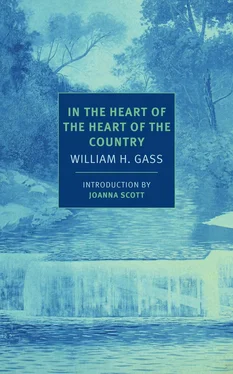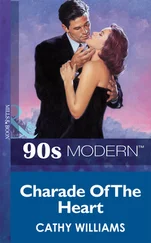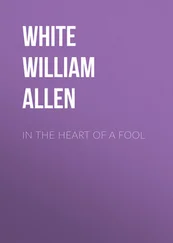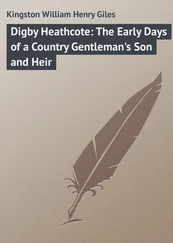Maybe the Pedersens were just asleep. Have to be sure the old man wasn’t watching. What a thing. Pa pretended sleep. Could he pretend death too? She wasn’t much. Fat. Gray. But a crotch is a crotch. The light in the window paled. The sky I could see was smoky. The bits of broken glass had glimmered out. I heard the wind. Snow by the window rose. From a beam a cobweb swung stiffly like a net of wire. Flakes followed one another in and disappeared. I counted desperately three, eleven, twenty-five. One lit beside me. Maybe the Pedersens were just asleep. I went to the door again and looked in. Little rows of lights lay on the glasses and the jars. I felt the floor with my foot. I thought suddenly of snakes. I pushed my feet along. I got to every corner but the floor was empty. Really it was a relief. I went back and hid behind the boxes. The wind was coming now, with snow, the glass glinting in unexpected places. The dead tops of roofing nails in an open keg glowed white. Oh for the love of god. Above me in the house I heard a door slam sharply. He was finished with waiting.
The kid for killing his family must freeze.
The stair was railless and steep. It seemed to stagger in the air. Thank god the treads were tight, and didn’t creak. Darkness swept under me. Terror of height. But I was only climbing with my sled under my arm. In a minute I’d shoot from the roof edge and rush down the steep drift, snow smoke behind me. I clung to the stair, stretched out. Fallen into space I’d float around a dark star. Not the calendar for March. Maybe they would find me in the spring, hanging from this stairway like a wintering cocoon.
I crawled up slowly and pushed the door open. The kitchen wallpaper had flowerpots on it, green and very big. Out of every one a great red flower grew. I began laughing. I liked the wallpaper. I loved it; it was mine; I felt the green pots and traced the huge flower that stuck out of it, laughing. To the left of the door at the head of the stair was a window that looked out on the back porch. I saw the wind hurrying snow off toward the snowman. Down the length of it the sky and all its light was lead and all the snow was ashy. Across the porch were footprints, deep and precise.
I was on the edge of celebration but I remembered in time and scooted in a closet, hunkering down between brooms, throwing my arms across my eyes. Down a long green hill there was a line of sheep. It had been my favorite picture in a book I’d had when I was eight. There were no people in it.
I’d been mad and pa had laughed. I’d had it since my birthday in the spring. Then he’d hid it. It was when we had the privy in the back. God, it was cold in there, dark beneath. I found it in the privy torn apart and on the freezing soggy floor in leaves. And down the hole I saw floating curly sheep. There was even ice. I’d been seized, and was rolling and kicking. Pa had struck himself and laughed. I only saved a red-cheeked fat-faced boy in blue I didn’t like. The cow was torn. Ma’d said I’d get another one someday. For a while, every day, even though the snow was piled and the sky dead and the winter wind was blowing, I watched for my aunt to come again and bring me a book like my ma’d said she would. She never came.
And I almost had Hans’s magazines.
But he might come again. Yet he’d not chase me home, not now, no. By god, the calendar was clean, the lines sharp and clear, the colors bright and gay, and there were eights on the ice and red mouths singing and the snow belonged to me and the high sky too, burningly handsome, fiercely blue. But he might. He was quick.
If it was warmer I couldn’t tell but it wasn’t as damp as by the boxes and I could smell soap. There was light in the kitchen. It came through the crack I’d left in the closet door to comfort me. But the light was fading. Through the crack I could see the sink, now milky. Flakes began to slide out of the sky and rub their corners off on the pane before they were caught by the wind again and blown away. In the gray I couldn’t see them. Then they would come — suddenly — from it, like chaff from grain, and brush the window while the wind eddied. Something black was bobbing. It was deep in the gray where the snow was. It bounced queerly and then it went. The black stocking cap, I thought.
I kicked a pail coming out and when I ran to the window my left leg gave way, banging me against the sink. The light was going. The snow was coming. It was coming almost even with the ground, my snow. Puffs were rising. Then, in a lull when the snow sank and it was light enough to see the snowbank shadows growing, I saw his back upon a horse. I saw the tail flick. And the snow came back. Great sheets flapped. He was gone.
3
Once, when dust rolled up from the road and the fields were high with heavy-handled wheat and the leaves of every tree were gray and curled up and hung head down, I went in the meadow with an old broom like a gun, where the dandelions had begun to seed and the low ground was cracked, and I flushed grasshoppers from the goldenrod in whirring clouds like quail and shot them down. I smelled wheat in the warm wind and every weed. I tasted dust in my mouth, and the house and barn and all the pails burned my eyes to look at. I rode the broom over the brown rocks. I hunted Horse Simon in the shade of a tree. I rode the broom over the brown meadow grass and with a fist like pistol butt and trigger shot the Indian on Horse Simon down. I rode across the dry plain. I rode into the dry creek. Dust rose up behind me. I went fast and shouted. The tractor was bright orange. It shimmered. Dust rolled behind it. I hid in the creek and followed as it came. I waited as its path curved toward me. I watched and waited. My eyes were tiny. I sprang out with a whoop and rode across the dry plain. My horse had a golden tail. Dust rolled up behind me. Pa was on the tractor in a broad-brimmed hat. With a fist like a pistol butt and trigger, going fast, I shot him down.
Pa would stop the tractor and get off and we’d walk across the creek to the little tree Simon stood his bowed head under. We’d sit by the tree and pa would pull a water bottle out from between its roots and drink. He’d swish it around in his mouth good before he swallowed. He’d wipe off the top and offer it to me. I’d take a pull like it was fiery and hand it back. Pa’d take another drink and sigh and get on up. Then he’d say: you feed the chickens like I told you? and I’d say I had, and then he’d say: how’s the hunting? and I’d say pretty good. He’d nod like he agreed and clap Simon on the behind and go on off, but he’d always say I’d best not play in the sun too long. I’d watch him go over the creek, waving his hat before his face before he put it on. Then I’d take a secret drink out of the bottle and wipe my lips and the lip of it. After that I’d go and let the ragweed brush against my knees, and then, sometimes, go home.
The fire had begun to feel warm. I rubbed my hands. I ate a stale biscuit.
Pa had taken the wagon to town. The sun was shining. Pa had gone to meet Big Hans at the station. There was snow around but mud was flowing and the fields had green in them again. Mud rode up on the wagon wheels. There was sweet air sometimes and the creek had water with the winter going. Through a crack in the privy door I saw him take the wagon to the train. I’d a habit, when I was twelve, of looking down. Something sparkled on the water. It was then I found the first one. The sun was shining. Mud was climbing the wagon wheels and pa was going to the train and down the tight creek snow was flowing. He had a ledge beneath the seat. You could reach right down. Already he had a knack for hiding. So I found it and poured it out in the hole. That was the last year we had the privy because when Big Hans came we tore it down.
Читать дальше












